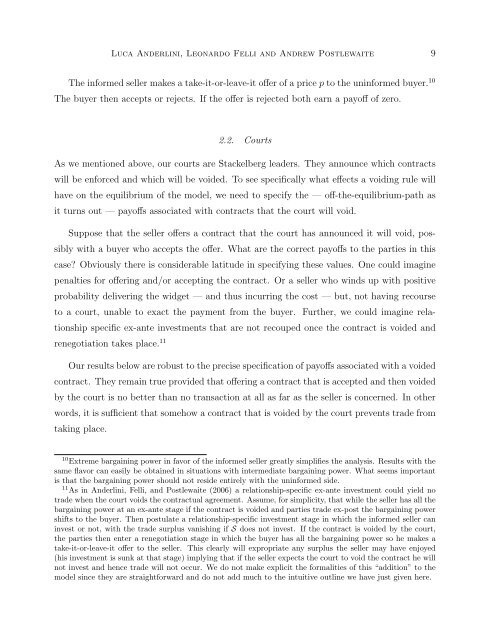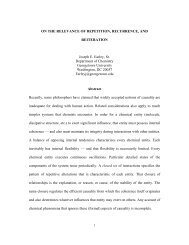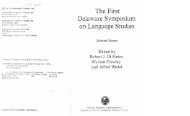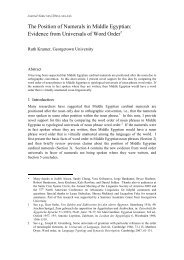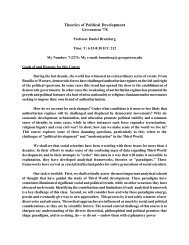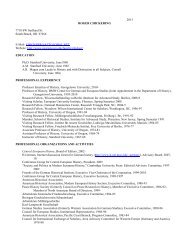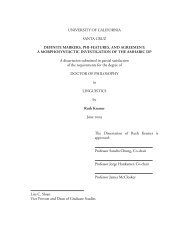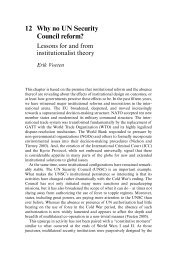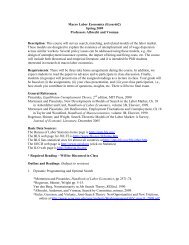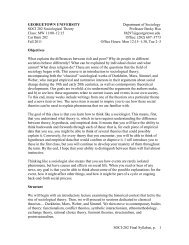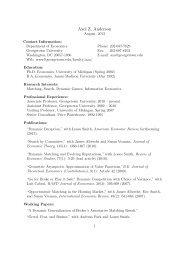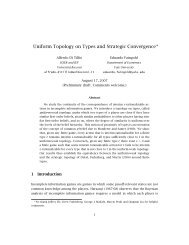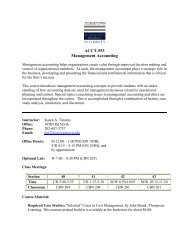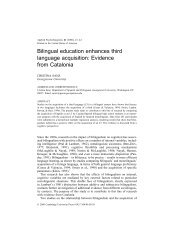PDF File - Georgetown University
PDF File - Georgetown University
PDF File - Georgetown University
You also want an ePaper? Increase the reach of your titles
YUMPU automatically turns print PDFs into web optimized ePapers that Google loves.
Luca Anderlini, Leonardo Felli and Andrew Postlewaite 9The informed seller makes a take-it-or-leave-it offer of a price p to the uninformed buyer. 10The buyer then accepts or rejects. If the offer is rejected both earn a payoff of zero.2.2. CourtsAs we mentioned above, our courts are Stackelberg leaders. They announce which contractswill be enforced and which will be voided. To see specifically what effects a voiding rule willhave on the equilibrium of the model, we need to specify the — off-the-equilibrium-path asit turns out — payoffs associated with contracts that the court will void.Suppose that the seller offers a contract that the court has announced it will void, possiblywith a buyer who accepts the offer. What are the correct payoffs to the parties in thiscase? Obviously there is considerable latitude in specifying these values. One could imaginepenalties for offering and/or accepting the contract. Or a seller who winds up with positiveprobability delivering the widget — and thus incurring the cost — but, not having recourseto a court, unable to exact the payment from the buyer. Further, we could imagine relationshipspecific ex-ante investments that are not recouped once the contract is voided andrenegotiation takes place. 11Our results below are robust to the precise specification of payoffs associated with a voidedcontract. They remain true provided that offering a contract that is accepted and then voidedby the court is no better than no transaction at all as far as the seller is concerned. In otherwords, it is sufficient that somehow a contract that is voided by the court prevents trade fromtaking place.10 Extreme bargaining power in favor of the informed seller greatly simplifies the analysis. Results with thesame flavor can easily be obtained in situations with intermediate bargaining power. What seems importantis that the bargaining power should not reside entirely with the uninformed side.11 As in Anderlini, Felli, and Postlewaite (2006) a relationship-specific ex-ante investment could yield notrade when the court voids the contractual agreement. Assume, for simplicity, that while the seller has all thebargaining power at an ex-ante stage if the contract is voided and parties trade ex-post the bargaining powershifts to the buyer. Then postulate a relationship-specific investment stage in which the informed seller caninvest or not, with the trade surplus vanishing if S does not invest. If the contract is voided by the court,the parties then enter a renegotiation stage in which the buyer has all the bargaining power so he makes atake-it-or-leave-it offer to the seller. This clearly will expropriate any surplus the seller may have enjoyed(his investment is sunk at that stage) implying that if the seller expects the court to void the contract he willnot invest and hence trade will not occur. We do not make explicit the formalities of this “addition” to themodel since they are straightforward and do not add much to the intuitive outline we have just given here.


